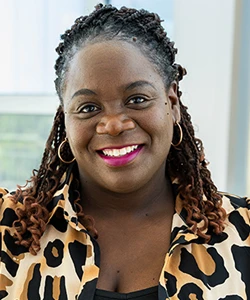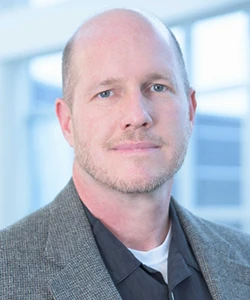
In honor of Veterans Day, we spoke to two veterans within the College of Community Innovation and Education about their time in the military and how it has influenced the work they do here at UCF.
While serving in the United States Marine Corps, W. Bryce Hagedorn had many experiences that would later translate into his passion and research in counseling.
Despite his father having been in the Navy, Hagedorn says he never endeavored to be in the military growing up. The decision to join came to him during a time in which he was ready for a change in his life. Hagedorn enlisted and served both in the infantry and as part of a specialized unit as a forward observer — a person who identifies targets during combat operations — during three deployments. This included once to the Middle East during Operation Desert Shield and Desert Storm.
“I got a lot more from the experience than I anticipated,” he says. “Looking back in hindsight now, it was a tough time — as any branch of the service can be — but I am glad that I went through it. I think it made me a better person. It also made me a more culturally competent counselor.”
One of the reasons he wanted to become a mental health counselor after his time spent serving was from witnessing how combat experience was dealt with after returning — or really, how it wasn’t dealt with.
“We returned from Kuwait and Iraq, and we were going to have our first week of free time in six months,” he recalls. “Our division commander said, ‘If any of you are having any problems with your heads, the shrinks are in the back. Otherwise, everybody gets one week of liberty.’ So, at that point, no one's going to stand up, walk to the back of the room and talk to a therapist or a psychologist, particularly if it's going to interfere with you going out for a week break.”
Things have gotten better since then, Hagedorn says, but that experience sparked his desire to research effective ways to deal with trauma, moral injury, addiction and more.
After moving to Florida and getting married, Hagedorn says he wanted to do something with his undergraduate degree in psychology. He jokes, “I had already done two of three jobs that do ‘therapy’ without a license — I was a bartender and a limo driver, but I wasn’t a hairdresser.”
“I learned I was a pretty good receiver of people’s stories,” he says. “They felt safe enough talking, and I felt I had some pretty good advice to give, although I had to learn how to not give advice as a therapist.”
He decided to get an advanced degree at UCF and applied to both the mental health counseling master's program and the clinical psychology master’s program. Ultimately, he decided to pursue counseling.
“I learned that the counseling philosophy of helping, collaboration, wellness and holistic approaches just resonated with me more than the medical model that psychology typically uses,” Hagedorn says. "I started taking classes and graduated in 2000 with my master's degree, and then went on to pursue my doctoral degree.”
Along with his work as a professor and program coordinator of the counselor education programs, he also volunteers with local Veterans Affairs Vet Centers, which are drop-in counseling centers for veterans and active military. He co-leads group sessions with the therapists at the centers and assists with staff development for the therapists, some of whom are UCF graduates.
When working with veterans, Hagedorn says he chooses to self-disclose his connection to the military to help build rapport with the clients who may otherwise be hesitant to seek the help they need. This differs from other client populations where it is not recommended to disclose personal experiences.
Part of his research, which he hopes to eventually incorporate into his work with Veterans Affairs, focuses on how mindfulness and self-compassion can be effective ways to deal with trauma as well as moral injury, which he explains is the soul’s response to things that happen in combat, such as not being able to prevent loss of life.
"I’m now looking for a culturally appropriate way of adapting mindfulness to the population,” Hagedorn says. "It would be good to put it into palatable terms for the military, like ‘training for the civilian sector.’ Another thing that the Army uses is called ‘battle mind,’ which is resiliency training prior to deployment. So, we might call this ‘post-battle mind,’ or how to get back to thinking like a civilian again.”

LaVera Henderson, MBA, SHRM-CP
Human Resources Partner III
CCIE Human Resources Business Center
LaVera Henderson’s career in the Navy began in 1993, when she joined as a disbursing clerk. Her role evolved over time into a personnel specialist, where she says she essentially worked in human resources for the military — and where her career in HR began.
Some of her duties included military payroll, benefits, career counseling, leave management and managing personnel files. As she progressed in her career, she worked as the Command Equal Opportunity Officer as well as the Drug and Alcohol Prevention Advisor, among other leadership roles.
“A lot of that translated here (at UCF),” Henderson says. “I served a total of a little more than 20 years in the Navy. I retired in August of 2013 and was hired at UCF in December that year, originally as an administrative assistant.”
Her decision to join the military came partially from witnessing the camaraderie and team mentality that her husband, who was also in the military, experienced. She also learned that there were many civilian jobs available in the military.
“I loved it,” she says. “Almost every job out there, there is something comparable in the military if you want to serve and do what you like.”
Now, she works in the College of Community Innovation and Education Human Resources Business Center. Her responsibilities include supporting the HR director and college needs, as well as overseeing the other coordinators who handle searches, hires, recruitment and onboarding.
“Although some outside of HR look at HR as the rule enforcers, that's really not what it is,” Henderson says. “Our goal is to ensure the experience of the employee is the best, that they are aware of the resources that are available to them, and just trying to make sure that the experience of working for UCF is great for them. Of course, there are policies and rules that come with it, but at the end of the day, what I enjoy is looking after the employees.”
One of the primary aspects of human resources that Henderson enjoys is meeting and impacting the lives of so many people. In fact, among her proudest moments from her time served was during her retirement ceremony, when she got to look out at all of the people who came to tell her what an impact she made on their lives.
“I was at my retirement ceremony, looking out at this drill hall, and there were over 300 people who attended my retirement ceremony,” she says. "There were so many people out there crying, and there was a line at the end of people just wanting to shake my hand and hug me, each one of them telling me what impact I made on them. It just made it all worth it.”
Today, she is grateful for that experience and the things that she learned that directly transferred to working in academia.
“I'm thankful that people still take the time to say thank you to those who serve,” Henderson says. “It is a sacrifice, of course, some greater than others. It's not an easy job to do, and I'm glad that there are people still out there who are willing to raise their hand and volunteer. I don't think I would do anything differently."
